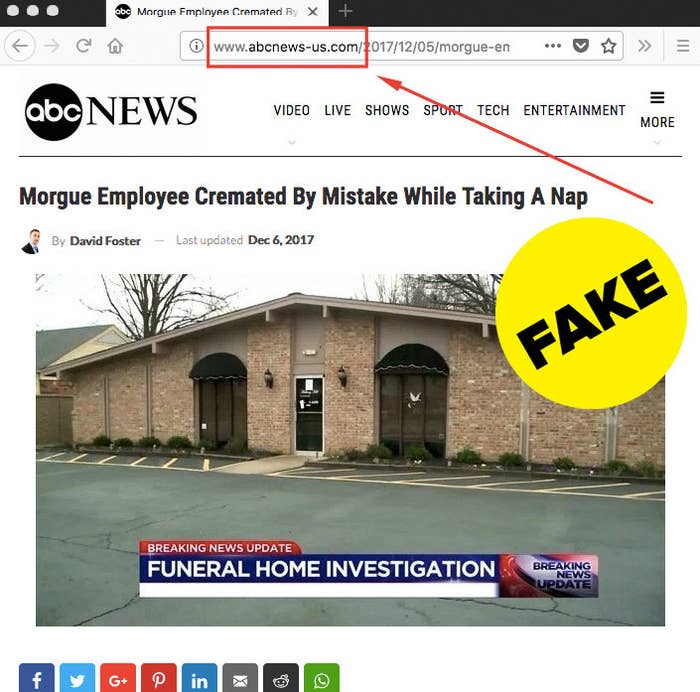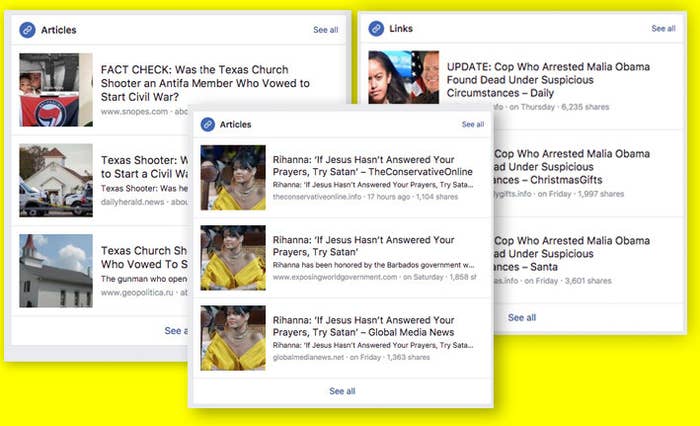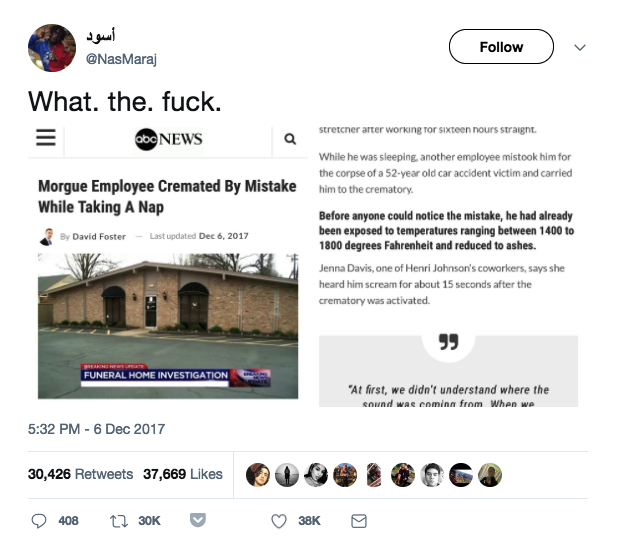
Back in March, a completely false story about a morgue employee being accidentally cremated went viral and earned almost a million likes, shares, and comments on Facebook, according to social tracking tool BuzzSumo. Many fact-checking sites like Snopes, Lead Stories, and BuzzFeed News debunked the story. But now, eight months later, copycat versions of the same hoax have sprung up on websites like abcnews-us.com and hella.site and they are once again spreading.
The story about the morgue worker isn't the only hoax that keeps coming back, according to a BuzzFeed News review of recent hoaxes and their copycat versions. In spite of efforts by Facebook to stop the spread of false content on its platform, unscrupulous publishers are scoring hits by copying and pasting old hoaxes into new websites. It's also common to see copycat version of a hoax emerge just hours after the original begins to get traction online.
For example, a hoax about Bruce Willis saying he's a Trump supporter took on new life recently after originally going viral in 2015. A fake story about students threatening to cut off their genitals if President Trump builds a wall has been re-posted every few months since it originally went viral, and has been getting thousands of Facebook engagements, according to BuzzSumo. Another hoax, about strip club diarrhea, was duplicated a month after it originally went viral. The difference was the market the story was aimed at — the original was set in Florida and the copy in Alberta.
In November 2016, Facebook and Google announced initiatives to curb mis- and disinformation on their platforms. Google said it will stop scam publishers from using its ad platform, AdSense. Facebook also said it will not display ads on fake news sites and started working with fact-checking news organizations to stamp out hoaxes and other false content.
A person with close knowledge of Facebook's efforts to fight misinformation told BuzzFeed News the company is aware of the problem of copycat version of hoaxes going viral.
"We are beginning to roll out improvements to identify more duplicate and similar articles," the source said.
There will also be a way for fact-checkers to simultaneously review several articles about the same subject. Those improvements will be rolled out in the next few weeks and be a focus in 2018, the source added.
One recent version of the morgue hoax, published on hella.site, bombards readers with advertisements. After BuzzFeed News contacted Google for comment, AdSense ads no longer appeared on the website, meaning the account was terminated. But other ad networks allow publishers to keep earning money. Another hoax that went viral recently, about Bruce Willis supporting Trump, also had Google AdSense ads on the page.
"As we get better, as tech gets better, the scammers and the scams also shift," Google spokeswoman Suzanne Blackburn told BuzzFeed News. "We have extensive policies that restrict publishers in our ad network from misleading, misrepresenting and deceiving users and advertisers — we enforce these policies vigorously. Last year alone, we removed 100,000 publishers for policy violations"
Google's policy doesn't necessarily evaluate content for accuracy or truth; it treats publishers of hoaxes as a variant of online scams.

In the case of the morgue employee hoax, it was copied at least two dozen times by different websites, according to a BuzzSumo search of the headline. Most of these earned thousands of Facebook engagements each. As BuzzFeed News previously reported, dubious websites will steal content that does well and the original creators can't do much about it. Sometimes, the hoaxes also live on through screenshots, images, and videos.
Another reason why copycat hoaxes work is that debunking takes time, while copying and pasting a story doesn't. Facebook works with fact-checking organizations like Snopes and PolitiFact, which look into stories and determine their veracity. But fact-checking can sometimes take up to three days, according to Facebook. So, while one story gets an 80% reduction in traffic after a fact-check, copycats still have time to duplicate it and keep profiting.

Older false content can also be easily found by searching for it on Facebook. In an email to BuzzFeed News, a Facebook spokesperson said that while false content could be pushed down in the feed by the algorithm, it's rarely deleted and is therefore still searchable.
"On Facebook Search, we are increasing the emphasis we put on quality signals like clickbait or low-quality ads experiences," he said.
"Simply put, we do not have policies about the truth. Such policies just aren't something we can write and enforce at scale, in an unbiased way. We cannot be truth’s arbiter," he added. Instead, Facebook hopes users will help dispute misinformation and challenge "provocative perspectives."
